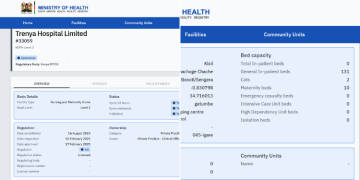A new report from the Ministry of Public Service reveals that 59% of Kenya’s public servants are grappling with mental-health issues, a growing crisis that is eroding workplace productivity and employee well-being.
Reasons for mental health cases
According to Esther Kinyanjui, Acting Director of the Directorate of Counselling and Wellness Services, the surge is driven by a combination of overwhelming workloads, financial pressure, and emotional exhaustion across professional and personal spheres.
The burden is particularly felt by female public servants, who are often torn between workplace obligations and traditional household expectations.
Psychological distress manifests in exhaustion, impaired concentration, and deeply troubling feelings of isolation.
Principal Secretary Amos Njoroge Gathecha previously highlighted a sharp escalation, noting that reported mental-illness cases in the public service jumped from roughly 5,000 to 13,000 within a single year.
The impact has been especially severe among uniformed officers in the police and prison services, where rising absenteeism, alcohol abuse, and even cases of suicide have become pressing concerns.
Economic Toll
Official estimates suggest that untreated mental illness costs the country more than Sh62.2 billion in 2020, a figure representing roughly 0.6 percent of the national GDP.
This staggering loss is attributed to reduced productivity, frequent absenteeism, premature retirements, and diminished efficiency across ministries, agencies, and county governments.
Civil servants experiencing stress, depression, or burnout often struggle to meet deadlines, perform at expected standards, or even report to work consistently.
The result is a cumulative drag on institutional performance, with critical government services, ranging from healthcare to policing, suffering setbacks.
The economic implications are exacerbated by the rising costs of healthcare and social support, as an increasing number of public servants require medical treatment, counseling, or rehabilitation, all of which contribute to the government’s financial burden.
Indirectly, families and communities bear the costs in the form of lost income, caregiving responsibilities, and long-term reliance on social networks.
Also Read: Outrage as Ruto’s Govt Borrowed Ksh 1.25 Trillion in One Year
In the long run, this translates into a weakened labour force and reduced national competitiveness.
Service delivery is already hampered in some areas, particularly within security and health sectors, where overstretched and mentally strained employees are tasked with critical, high-pressure duties.
Government steps up
In response to the alarming trend, the Ministry of Public Service has introduced a new Workplace Mental Health Policy, designed to integrate counselling, wellness programs, and preventive care into the fabric of government institutions.
The policy focuses on early detection, confidential support systems, and tailored interventions for high-risk groups, including police officers, prison warders, and frontline healthcare staff.
The PS argues that addressing mental health at the workplace is not only a moral imperative but also a practical necessity to sustain the efficiency of public administration.
However, Kenya still has fewer than 600 practicing psychiatrists for a population exceeding 55 million, with most of them concentrated in urban centres.
Rural areas, where a significant portion of civil servants are deployed, continue to lack access to specialized care.
Also Read: Govt Answers the Top 5 Questions Kenyans Are Asking About NYOTA Project
Counselling units within ministries and county governments are understaffed, underfunded, and in many cases unable to meet the demand for sustained psychological support.
The challenge is compounded by stigma, which discourages many civil servants from seeking help.
Fear of professional repercussions, such as stalled promotions or perceived weakness, often leads employees to suffer in silence.
Even those who attempt to access services face long waiting times, limited follow-up care, and inadequate rehabilitation facilities.
The government’s pledge to prioritize mental health in the public service is being tested against the harsh realities of insufficient funding, systemic irregularities, and cultural barriers.
Follow our WhatsApp Channel and X Account for real-time news updates.












































































